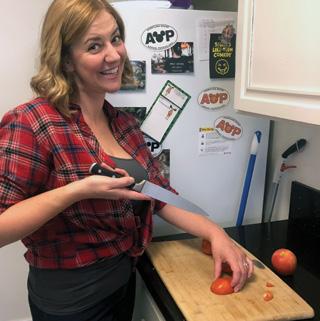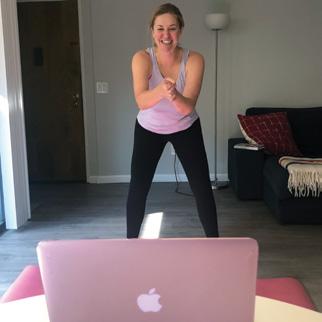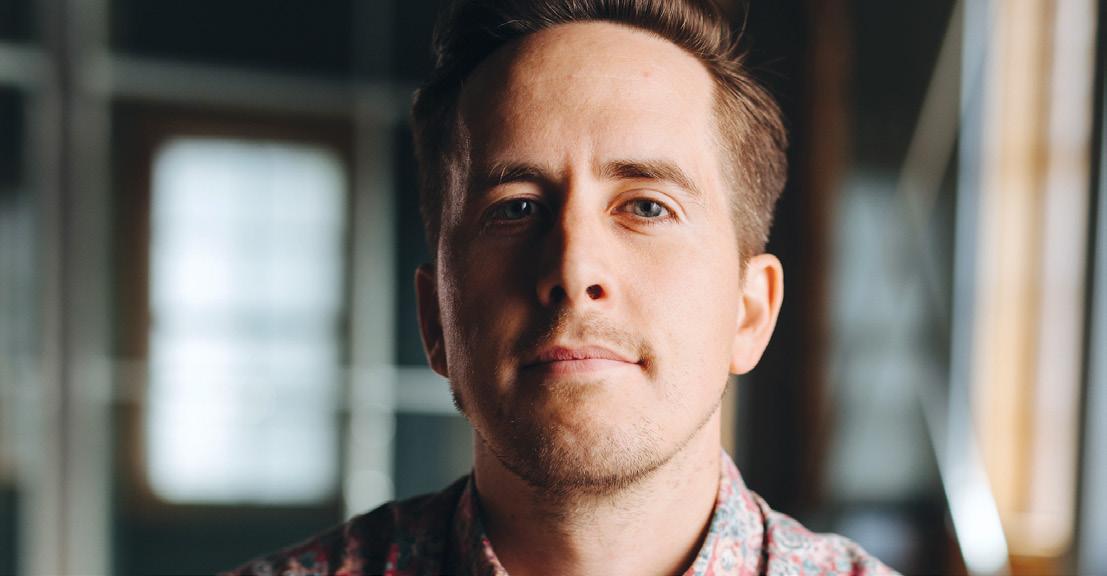
12 minute read
Dal Profiles
we are daL
Aziz Bojang Staff, Security Services
Iwas a police officer in my country, Gambia, and I was brought [to Canada in 2004] to understudy policing but also restorative justice. In the restorative justice training I was asked this question: ‘What would you like to see happen to you when you are arrested?’ The one thing I would really love is to be heard. To be told what I have done, but also to be given the chance.
In 2007, I was deployed to the United Nations mission in Sudan and I served for two years there. When I came back to Gambia I actually lost my job. We had a dictator who did a lot of bad things. If you are not willing to do that you lose your job. They were not much for my orientation to human rights and democratic policing.
When I came to Canada, waiting for my residency, I did all sorts of other jobs including security and I worked with an agency that dealt with kids with mental challenges. Even when this job [at Dal] came up, I was a little bit reluctant to leave because of my attachment [to the kids].
For me, I’m not motivated by money. My greatest motivation is when I know that my actions have impacted someone in a positive way. “When I completed school and started working, I made it a duty to make sure that all my junior siblings go to school and I pay for them.”
We are a community of doers, dreamers, learners, teachers, builders, neighbours and more. Read more at WeAre.Dal.Ca
PeoPLe
leslie seiler (ba’00) is an actor, improviser, director and writer. As she continues to navigate her career and life during the pandemic, she takes us through a typical day.
24 hours
7:00 a.m. I awake to the sound of my husband teaching online improv camps. We aren’t quite in our Hollywood Hills home yet, so this one bedroom is cozy! I don’t mind this wake up. It reminds me how unpredictable this career path is and the crazy adventure we are on.
8:30 a.m. Get up for real. Then, coffee.
9:00 a.m. Workout on Instagram, with my Toronto Gym, Elle Fitness. On Fridays, eight of my girlfriends and I jump on Zoom and do the class “together.” It keeps us fit and sane.
10:00 a.m. Keep working out—sort of. After 20 years, I’ve decided to finish my Group Fitness Instructor training. Being locked down gives you time to finish decades old projects, so I’m working on choreography. By the end of the hour I am very satisfied with my “Footloose” routine.
11:00 a.m. Shower and maybe lunch.
noon Check and answer emails. I may have an audition. If it’s due ASAP then straight to hair and makeup, setting up lights and shooting it. If it’s due any later, I will procrastinate until the last moment. If it’s a voice audition, I record it in my sound booth (aka: our storage closet). 2:00 P.m. Study the next chapter in my Group Fitness Instructor Course.
3:00 P.m. Write “24 Hours” piece for Dal Alumni Magazine. Try to make “Lock Downed Life” in L.A. seem really cool and not at all sad.
4:00 P.m. Depending on the day, either: go to grocery store, prepare my lesson plan (I teach Improv and Sketch Writing online) or work on my stand-up sets for Burbank Comedy Festival.
6:00 P.m. Make dinner (if not teaching or doing an online open mic), while watching a Marvel movie I’ve seen 100 times.
8:00 P.m. Head to a patio to meet friends! JUST KIDDING! We can’t go anywhere. Binge on a show or do a Zoom game night with friends or family.
midnighT Off to bed to see what tomorrow brings. Maybe things will start to reopen and we’ll go back to in- person auditions, jobs and live shows! Maybe I’ll be “Groundhog Daying” this day until 2021. But locked down or not, the possibility of every day here truly is an adventure.

Seiler’s days have been filled with pandemic cooking, Zoom exercise classes and auditions from her home sound booth (aka her storage closet). “Maybe I’ll be Groundhog Daying this day until 2021,” she says.


spotlight

Thought-provoking satire put chris kelly’s production company centre stage for awards in 2020
When Chris Kelly’s (ba’04) production company Kelly & Kelly won two big prizes in 2020, he ended up delivering his acceptance speeches from his front lawn. But even if covid-19 made the occasions less ceremonial, they were still impressive. Kelly&Kelly, based in Vancouver, took home a prominent Webby prize for Best Writing for Video and a Rockie award for Podcast of the Year from the Banff World Media Festival.
Aftershot, which took home the Webby, is a fake advertisement for an app to help American lawmakers decide when it’s appropriate to discuss gun control. It was commissioned by The New York Times after its op-ed video department heard about another of Kelly&Kelly’s satirical videos called argyou.
“I don’t know how much satire can actually do to make change,” Kelly says. “I think you need policy makers and people in government positions to make the change. But obviously satire has a great way of making conversation—of putting it into culture and pointing at things that need to change and pointing out the ludicrousness especially of the gun situation in the States. When it came out it sparked a conversation.”
A former music journalist at CBC, Kelly produced cbc Radio’s This is That for almost 10 years. It created many spinoff works of satire including a web series called This is That Video.
Aftershot took a month to write and was filmed on the day of the Squirrel Hills shooting in Pittsburgh in 2018—making the work all the more relevant. A conversation on set led to a familial connection: while chatting with one of the actors, a fellow Maritimer, Kelly discovered the actor was actually his third cousin.
Kelly reflects on his time at Dal often, but it took him working on This is That and with big name actors like Kevin Nealon (snl), Charles Dance (Game of Thrones) and Natasha Lyonne (Orange is the New Black) to realize just how much he still relies on lessons learned from his time on campus.
“There was a point in my life where I was like ‘I’m not using this degree,’” he explains. “Around 2010 we started making This is That and that involved working with performers on a daily basis, writing sketches and directing people. After doing that for a couple of months, I realized ‘This is it—this is everything I learned.’ It was such a benefit to have that education backing that up.”—Janet Dyson
innovator

“I’m committed to social justice and anti-racism in all aspects of our lives, including [formal and informal] education. Claims of cultural and racial neutrality and colourblindness hamper our ability to fully identify the barriers Black people encounter. This is why I believe sharing information and knowledge is vital.” As the James Robinson Johnston (jrj) Chair in Black Canadian Studies,
dr. omisoore dryden
is fostering community outreach, and working to provide greater representation of Black health within medical education.
innoVaTion: Dr. Dryden’s focus as jrj Chair is to address anti-Black racism, medical education, and health inequities and disparities. Her research explores the importance of collecting disaggregated race-based data and the importance of community informed governance models to manage that data. This would mean that before disaggregated racebased data of Black and African Nova Scotian communities is collected, these communities must first be consulted and involved in the development of data collection protocols, oversight of the data, and decisions with how the data will be used.
FoundaTion: “Black Studies is the venue in which I do my work. Although Black Studies is often only associated with the humanities and social sciences, this is just not the case. There is vibrant and important research and interventions within the medical sciences, medical education and health studies,” says Dr. Dryden. “I am particularly interested in how the intersecting realities that impact the lives of Black queer and trans people is accounted for. Most recently, I focused on the experiences within the Canadian blood donation system of Black men who have sex with men.”
insPiraTion: “I am inspired by the activism and scholarship of Black queer and trans scholars who have been involved with some of the larger civil rights and activist movements (March on Washington, Black Panthers, blm) and those whose work is not as well known.”
whY iT maTTers: According to Dr. Dryden, her work has helped remove some of the barriers that Black gay and bisexual men have faced when donating blood, though there is much more work to be done. “It is my hope that by adding my voice to the discussion on systemic racism embedded in the policy responses to the covid pandemic, it will help to effectively address and resolve health inequities and disparities.”—JasonBremner

why i give
As a member of the Dal community, alumnus shashank gupta was inspired to support students during the pandemic
Shashank Gupta (meng’17) can still recall the night he arrived in Halifax in 2015. While it is hard to forget the January snowstorm that greeted him, it was an act of kindness that made his arrival memorable.
“I knew absolutely no one in Halifax; all I had were the phone numbers of some of my classmates,” says Gupta, who moved to Halifax from India to study Engineering. “I took a taxi to downtown [Halifax] and asked a stranger on the street if I could use their phone to call a classmate. The stranger was so kind and helpful. It truly gave me a sense of what I could expect from both the Halifax and Dalhousie community.”
And throughout his time at Dal, his expectations were met. So, when Gupta saw an appeal from his alma mater to support students in need during the covid-19 pandemic, it was that sense of community that inspired him to give back. “In my culture, when you’re a member of a community, you try to do what you can to help the people within it. I felt compelled to support Dalhousie students during these trying times,” he says.
Gupta, who now lives in Ottawa, is just one of the more than 350 donors who gave to the Student Emergency Relief Fund. The fund was established to meet the needs of students who needed urgent and immediate support due to loss of employment, unexpected travel costs or restrictions, food insecurity and housing concerns as a result of the pandemic.
“Thinking about the struggles students faced touched my heart. I knew this pandemic threw off plans and disrupted many lives,” says Gupta, who shared that he and his now wife were unable to go to India for their wedding in April.
As a former international student, he also recognized that those students were likely facing a unique set of circumstances. “I can relate to international students who are far from home and how difficult that can be. You rely on the connections with your classmates, friends and professors to deal with the isolation you sometimes face. But the pandemic took away those connections.”
Knowing that, he, collectively with other donors, was able to make a difference to 1,100 students in need is a rewarding feeling, he says, and ultimately, he sees it as a way to show his own gratitude. “I feel very fortunate to be a part of this community. I’m in a position to give back because of my education. Helping students in need is my way of returning to Dal and its people what it gave to me.” —Fallon Bourgeois

why i do it
madeleine stinson
President, Dalhousie Student Union
her backsTorY: Born and raised near London, Ont., Stinson’s interest in Dalhousie was piqued when she discovered its strength in sustainability studies—something she continues to pursue now as a fourth-year student in the Faculty of Management majoring in Environment, Sustainability and Society. Stinson’s campaign for the dsu presidency earlier this year centred around three key priorities: executive accountability, organizational sustainability, and a better community. covid-19 has forced Stinson and her team to rethink how to follow through on some of their promises, but she insists changes in the works now will ensure the dsu works better for students. “We are doing a complete review of all of our policies, which doesn’t happen often. We are changing a lot of procedures to make sure that it is accountable, it’s transparent, it’s ethical”
highLighTs: In high school, Stinson was an active member of a non-profit group that offers training for youth interested in building business leadership skills. She eventually moved into the role of president for the group’s regional chapter. The experience opened her eyes to her own future ambitions, but not in the way she expected. “I found business to be not compassionate enough for what I wanted to do. There just wasn’t enough room for compassion and community and contributing to society in the way I wanted to,” she says, helping explain her decision to expand her studies into environmental issues.
whY i do iT: “I never thought I would run for president. Despite what my past sounds like, I prefer to do my own thing. I don’t really love being the centre of attention. But I came to the point where I saw that the dsu wasn’t having a positive impact on all students,” she says. “I wasn’t in the position to enact the change that I wanted to see, so I said, ’Well, if I can’t get into the room now, I’ll run and then chair the conversation. I’ll be that person.’” —Matt Reeder
COVID-19 has changed the way we engage with students for now, but we are working hard to deliver a meaningful Dalhousie experience. We remain dedicated to academic excellence, to creating new opportunities for connection and to supporting our community’s safety. We hope we’ll be welcoming everyone back to campus soon.









